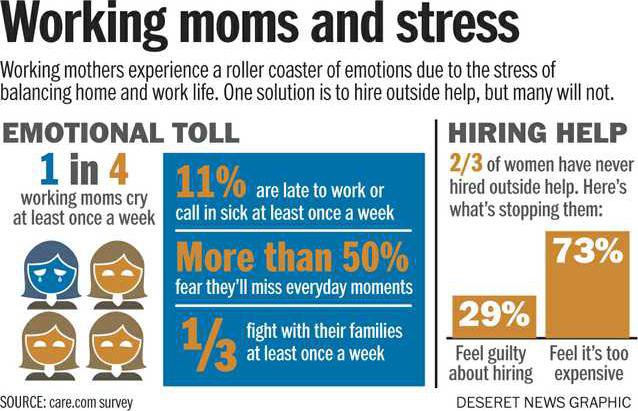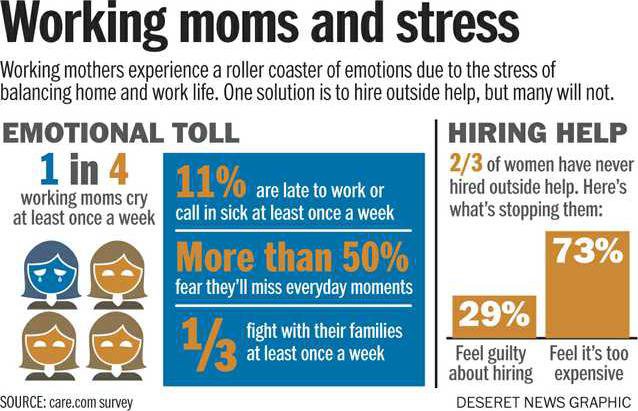![]() A recent survey found that while working mothers take on most of the chores and child care at home, two-thirds of them don't hire outside help because they find it too expensive or they feel guilty for having to ask.
A recent survey found that while working mothers take on most of the chores and child care at home, two-thirds of them don't hire outside help because they find it too expensive or they feel guilty for having to ask.
Government labor statistics show 30 percent of mothers don't work outside the home. But among those who do, Care.com, an online website for finding and managing family care, conducted the survey that found working mothers spend an average of 37 hours a week at work and double that amount of time, 80 hours, on chores, child care and housekeeping. Out of the 991 mothers surveyed, 85 percent were married, 11 percent were in a domestic partnership and 3 percent were single mothers with a child part- or full-time.
While Care.com encourages working mothers to ask for or hire help, among those who won't, 73 percent said they couldn't afford outside help, while 29 percent said they felt guilty for needing help.
A third of mothers choose not work outside the home, according to government labor statistics, and all kinds of mothers can face feelings of overwhelm or guilt. For mothers who do work outside the home, whether by necessity or choice, the number of competing demands on their time is ratcheted up. Katie Herrick Bugbee, the Global Parenting expert at Care.com and a mother, said mothers need to ask for help before they reach a breaking point. The extra help can come from a spouse, friends, parents or a hired caregiver.
“That is what we need to teach parents and moms. The guilt will always be there, no matter what, it just is. It is this drive to be perfect, to be better than our own mothers were, to have it all," Bugbee said. “We need to cut ourselves some slack.”
Another recent survey also found that an overwhelming majority of men agree that husbands and wives should equally share in responsibilities at home and almost half of the men want to do this.
Mothers in the workforce
The stresses and strains of balancing work and home responsibilities between spouses have increased as more women have entered the workforce in the past half century.
The Bureau of Labor Statistics and the Census Bureau reported that in 1962, 54.4 percent of mothers worked outside the home, compared to 70.5 percent in 2012.
According to the Bureau's more recent 2013 report, 59.1 percent of couples with children had both parents employed. In families with no spouse, 68.2 percent of mothers were employed and 81.2 percent of fathers. The bureau counted 34.4 million families with children and 88.2 percent of those families had at least one employed parent.
Financial necessity, ambition to have a career and many other motivations contribute to mothers pulling double duty balancing work and family needs. Bugbee also noted a rise in care needs for multi-generation households as a more recent reason for mothers working outside the home to bring in additional income.
Bugbee explained that in the current domestic climate, Care.com surveyed women to find out which parent is doing the brunt of the work at home and also to identify at what point mothers need to ask for additional assistance.
"In this generation of moms, moms are trying to do it all," Bugbee said, "It can be stressful, incredibly stressful.”
The Care.com survey found that one in four working mothers said they cry alone at least once a week due to household-related stress.
Communication is key
Bugbee explained that spouses need to communicate on how they each can make raising children and taking care of other household responsibilities a team effort. If one spouse is taking on too much, the other needs to say, “How can I help you here? This is a lot for both of us, let's figure this out,” she said.
A 2014 survey, “How Men Flex”, conducted by the Working Mother Research Institute (WMRI) and sponsored by Ernst & Young LLP, aimed to better understand how men balance work and home responsibilities. Out of the 1,000 men surveyed, 88 percent said they believed that parents should equally share in taking care of the children, and 83 percent agreed that both partners should share chores.
Fathers, like mothers, are also trying to balance their work schedules and family needs.
But Karyn Twaronite, EY Global Diversity & Inclusiveness Officer, told the Working Mother website that men are usually an afterthought in discussing issues surrounding working parents and workplace flexibility.
“Our experience and research show we have to shift our thinking, our offerings and our communications to be much more modern and more inclusive of men," she said. "Everyone wants to have meaningful work and personal lives, and flexibility is a great equalizer, helping men and women to achieve their professional and personal goals.”
Her husband's willingness to pitch in at home is key for Jodi Peterson to be able to manage her responsibilities as deputy office administrator at the U.S. Senate and care for their four children. She is also taking online courses to finish a bachelor’s degree.
Her husband, David, an Army captain, has an erratic schedule that often takes him away from home for weeks at a time.
“I would have a lot of stress, but being a successful working mom has nothing to do with me working by myself. It has everything to do with the support I receive from my husband,” she said. “I couldn’t do what I do without what he does.”
Peterson described the division of labor in her family. “He does all the laundry and helps feed the kids, vacuum and clean. All the things a typical mom takes care of, I am supported by my husband in that,” Peterson said.
Peterson and Bugbee said they also pay a nanny to help.
But the Care.com survey indicated making that decision is difficult, even when finances are not an issue.
“We know that we have working mom stress and working mom guilt, but to feel the added guilt of needing to do this yourself, of needing to clean the bathroom yourself, even when you can afford to hire help or ask their husbands for help — it is painful,” Bugbee said.
The average rate of a housekeeper is $15.71 dollars an hour and the average rate of a babysitter is $11.49 dollars an hour, the Care.com survey reported.
But Bugbee's group, which promotes employing nannies, contends it's worth the expense, pointing to the survey that found 75 percent of those surveyed said hiring outside help has reduced their overall stress.
There are single mothers, however, who don't have access to help from family or the resources to hire a nanny or a housekeeper.
Child Care Aware, a program that provides resources for child care programs, has a state by state map that gives outside links for parents to find financial assistance, support networks and outreach programs.
Single mothers can also use the U.S. Office of Personnel Management Child Care Resources Handbook that includes federally sponsored child care centers, financial assistance for low-income parents, and a guide to find child care.
Stop Comparing
On the topic of balancing family and work activities, the Care.com survey found that 62 percent of working mothers believe that other parents have an easier time accomplishing everyday tasks and 28 percent think that their friends "have it more together than they do."
Peterson said making comparisons can lead to bad decisions and unnecessary frustration.
"I don’t want anyone to ever look at me and say, 'Well, Jodi is doing it, so I should leave my family and go.' I am scared to death that someone is going to do that," she said.
Peterson explained that there was a series of events that led to her and her husband deciding she would work outside the home, and she said each family should evaluate their unique situation as they did.
“Each family is so unique. You need to make sure, first and foremost, even above the kids, that the spouse and you balance," she said. "If you are not a single mom, and married to somebody, you need to make sure that relationship is intact, and everything after that will fall into place.”
Email: kclark@deseretnews.com








